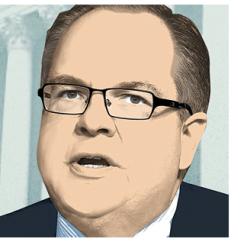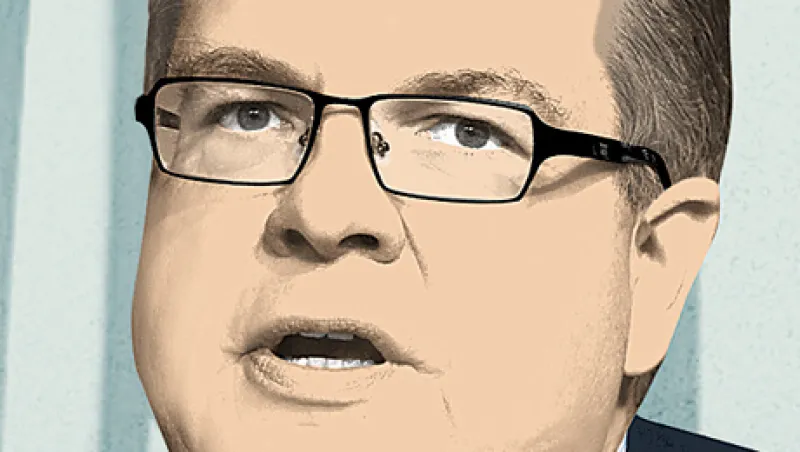Mick Jagger turns 70 in July, well past a normal retirement age, and he’s got plenty of company. Each day, 10,000 people reach 65 in the U.S. alone. Unlike Jagger, the majority have a fraction of what they need to stop working. Ronald O’Hanley, president of asset management and corporate services for Fidelity Investments, says the U.S. faces a catastrophe if it doesn’t address the problems with its retirement system. Most working Americans have little hope of maintaining their current living standards when they retire, he adds.
With Social Security under pressure and defined benefit pension plans on the decline, defined contribution plans such as 401(k)s are becoming the main means of funding retirement. Under these plans, employees and employers contribute to portable accounts that enjoy tax-sheltered status until retirees withdraw benefits. Boston-based Fidelity is the country’s largest 401(k) manager, with more than $1 trillion in retirement assets.
O’Hanley, 56, joined the firm in 2010 from BNY Mellon Asset Management, where he was president and CEO. Senior Writer Julie Segal spoke with him recently about proposals to limit defined contribution plans’ tax advantages and the mistakes that contributed to the retirement shortfall.
The Simpson-Bowles commission and others have recommended limiting tax benefits for retirement plans. Why do you oppose these limits?
First, the proposals are illogical: They don’t raise a lot of revenue. Now contributions and earnings on that money are allowed to grow tax-free until employees start making withdrawals from retirement accounts. At

Point No. 2 is, these incentives matter. We have a lot of data on this because we’re the largest recordkeeper out there and we spend a lot of time talking to our plan participants. We know what drives their behavior. Even people too young to imagine retirement are still contributing because they like paying less in taxes right now.
Why fight this battle when people have saved only a small percentage of what they need for retirement?
Because the more you save, the more you’ll have when you want to retire. So the government needs to continue to provide incentives. Most people focus on investment performance as key to what they’ll have in retirement. Investment performance is probably the least important of four factors.
People need to start saving as early in their careers as possible so they can benefit from compounding. Even if money is compounding at a fairly low rate of return, it’s still compounding for a lot of years. Second, people need to save more. Third is asset allocation; fourth is investment performance.
Target date funds, which are used by the majority of 401(k) plan sponsors as default options, have been criticized for having large equity allocations and limited diversification. Can they be made less volatile?
If you look at our target date funds, many years ago we started adding exposure to commodities and real assets to increase their diversification. What I would caution you on with this question is, managing volatility always sounds like a good thing to do. People are only thinking of it in terms of managing downside volatility, but when you manage volatility you’re going to manage it on the downside and the upside.
What could the fund industry have done better to get people to save more?
Education and guidance. We find there’s an incredible lack of understanding of even some of the basics. On an intuitive basis people get it, but very, very few people accept that starting earlier is much more important than your investment return.
One reason we haven’t done a better job is that regulation makes plan sponsors nervous that if they provide guidance, they are going to be susceptible to a lawsuit down the road. But another reason is that the technology tools we give participants are not easy to use, and many are just boring. We’re doing work here on gamification, making tools available that mimic how younger participants interact online.
Are high fees part of the problem as well?
Excessive fees are always a drag on investment return. That’s the way you ought to think about fees, because we show returns net of fees. Obviously, if fees were lower, returns would be higher. Relative to the four factors I gave you, fees would be five. You’re probably saying, well, of course I’m going to say that; I’m the provider here. But if you look at fees in defined contribution plans over time, there’s been a steady move down, and that’s a good thing for everybody.







